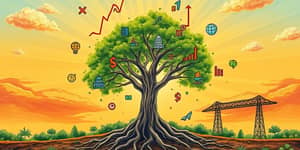
In a world obsessed with the latest gadgets and flashy possessions, there is a quieter revolution taking place. More people are discovering that moments spent traveling, learning, and connecting can deliver longer-lasting happiness and satisfaction than any material purchase. This shift toward the "experience economy" reveals a hidden return on investment that goes beyond bank statements and credit card balances.
Extensive research in psychology consistently shows that money spent on experiences yields deeper emotional rewards than money spent on objects. When you buy a new gadget, you might feel excitement for a few days or weeks, but that feeling quickly fades. Psychologists call this phenomenon "hedonic adaptation"—we grow used to new possessions and take them for granted.
By contrast, experiences continue to reward us long after they end. The anticipation of an adventure boosts mood, and the memories we create offer an "afterglow" of joy that resurfaces whenever we reminisce. As Van Boven and Gilovich found, people adapt more slowly to experiences, so the positive emotions last longer.
Recent data underscores the growing dominance of experience-based spending. According to the Mastercard Economics Institute, European consumers increased their share of spending on experiences from 19% in 2019 to 22% in 2023. Globally, Empower reports that consumers spent a staggering $2.1 trillion on experiences last year, while material spending plateaued.
Event-driven boosts illustrate the broader economic impact. Cities hosting major concerts, like Taylor Swift’s tours, see food and beverage revenue jump by 68% and accommodation revenue by 40%, demonstrating how live events can invigorate local economies and generate cascading returns.
When we calculate traditional ROI, we focus on dollars and cents. But experiences offer several forms of intangible return that often go unnoticed in financial statements. First, they deliver lasting psychological benefits—from sustained well-being to reduced stress.
Second, experiences are inherently social. Whether it’s a group hike or a cooking class, they build social capital, strengthening friendships and professional networks. Finally, experiences enrich our personal narratives. We become the storytellers of our adventures, and these stories carry meaning far beyond any physical item.
Brands have taken notice of the experience economy’s potential. Companies like Mastercard invest heavily in partnerships for memorable live events, from sporting championships to exclusive VIP gatherings. By offering personalized, immersive experiences, they deepen customer engagement and loyalty.
For local economies, the impact can be transformative. Beyond ticket sales, events drive revenue in hospitality, transportation, and retail. Municipalities that support festivals and cultural gatherings often see a ripple effect of job creation and community revitalization.
The experiential advantage is most pronounced in societies where basic material needs are already met. For individuals struggling to afford essentials, a dependable household item may rightfully take precedence over a weekend getaway. Moreover, not all experiences yield positive returns—extreme adventures or poorly planned trips can lead to stress and regret.
Cultural values and personality traits also play a role. Some people derive more satisfaction from owning collectibles or designer goods. The key is balance: understanding your values and financial circumstances before prioritizing one form of consumption over another.
Investing in experiences is not about rejecting material goods entirely. It’s about recognizing that the most valuable returns often lie in the intangible realms of emotion, memory, and connection. When you plan your next purchase, ask yourself whether it will enrich your personal narrative or simply gather dust on a shelf.
By consciously directing resources toward meaningful experiences, you unlock a richer, more enduring form of value—one that feeds the soul and strengthens the ties that bind us.
References













